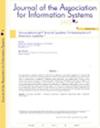应用程序设计中的网络配置:单工和多工网络对团队绩效的影响
IF 5.5
3区 管理学
Q1 COMPUTER SCIENCE, INFORMATION SYSTEMS
引用次数: 5
摘要
手机应用程序设计团队的成员相互协作,完成任务和/或社交。然而,工具性和表达性互动的网络配置如何影响团队创造力、效率和满意度尚未得到研究。考虑到团队中的单一和多重社会网络,本研究建立了一个研究模型,考察不同类型的网络集中化对团队绩效的影响机制。为了验证我们的研究假设,我们收集了62个学生团队的数据,这些学生团队参与了一个应用设计课程项目。研究发现,工具表达型多元网络的集中化降低了团队的信息细化和相似性感知;仪器单纯形网络的集中化有利于信息细化;团队信息细化对团队创造力、效率和满意度有正向影响。团队相似性感知负向影响团队创造力,正向影响团队满意度。为了减轻对网络配置和信息细化或相似感知之间潜在的同时性偏差的担忧,我们基于交叉滞后分析和从48个设计团队在两个点收集的额外数据复制了结果:团队建立和项目完成。本文通过研究多路和单路网络的配置影响团队绩效的机制,为软件开发的文献做出了贡献。本文章由计算机程序翻译,如有差异,请以英文原文为准。
Network Configuration in App Design: The Effects of Simplex and Multiplex Networks on Team Performance
Members of mobile app design teams collaborate with each other to accomplish tasks and/or to socialize. However, how network configuration of instrumental and expressive interactions affects team creativity, efficiency, and satisfaction has not yet been studied. Accounting for both simplex and multiplex social networks in teams, this study develops a research model examining the mechanisms by which the centralization of different types of networks impacts team performance. To test our research hypotheses, we collected data from 62 student teams working on an app design class project. We found that the centralization of the instrumental-expressive multiplex network reduces teams’ information elaboration and similarity perception; the centralization of the instrumental simplex network is beneficial to information elaboration; and team information elaboration positively influences team creativity, efficiency, and satisfaction. We also found that team similarity perception negatively affects team creativity and positively affects team satisfaction. To alleviate concerns about the potential simultaneity bias between network configuration and information elaboration or similarity perception, we replicated the results based on a cross-lagged analysis with additional data collected from 48 design teams at two points: at team establishment and at project completion. This paper contributes to the literature on software development by examining the mechanisms via which the configuration of multiplex and simplex networks affects team performance.
求助全文
通过发布文献求助,成功后即可免费获取论文全文。
去求助
来源期刊

Journal of the Association for Information Systems
工程技术-计算机:信息系统
CiteScore
11.20
自引率
5.20%
发文量
33
审稿时长
>12 weeks
期刊介绍:
The Journal of the Association for Information Systems (JAIS), the flagship journal of the Association for Information Systems, publishes the highest quality scholarship in the field of information systems. It is inclusive in topics, level and unit of analysis, theory, method and philosophical and research approach, reflecting all aspects of Information Systems globally. The Journal promotes innovative, interesting and rigorously developed conceptual and empirical contributions and encourages theory based multi- or inter-disciplinary research.
 求助内容:
求助内容: 应助结果提醒方式:
应助结果提醒方式:


